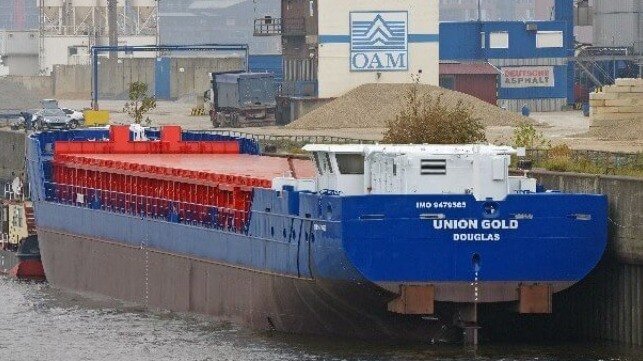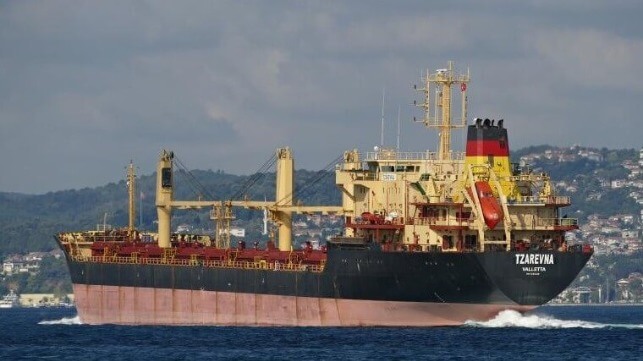Storm Darragh Drives Barge Aground off Normandy

Despite multiple attempts to connect an emergency tow, a runaway barge has gone aground on the picturesque beaches of Sotteville-sur-Mer, France. It was one of many marine casualties stemming from Storm Darragh, which swept over the British Isles and the coastline of northern France last weekend.
On Friday evening, the 120-meter deck barge AMT Challenger broke away from the oceangoing tug Boka Glacier at a position east of the Isle of Wight, on the north side of the English Channel. The barge drifted with the wind, and it entered French waters at about 2300 hours.
On Saturday, the shipowner contracted with two salvage tugs - Abeille Horizon and the Princess - to attempt to connect an emergency tow. In sustained winds of 40 knots, conditions were too rough for the operation and their efforts were not successful - even after a French Navy helicopter flew a four-man salvage team onto the barge to assist.
Courtesy Premar Manche
By Sunday morning the barge was just six nautical miles off the coast of the Seine-Maritime region, near St. Valery-en-Caux. At about 1300, French SAR coordinators determined that a grounding was imminent and informed local municipalities to take precautions, including setting up a cordon to keep bystanders at a distance. The barge went aground shortly after on a sandy beach near Sotteville-sur-Mer.
Upon grounding, the deck barge was immediately ballasted down using its own pumps in order to prevent further movement. It poses little hazard to the marine environment, according to the Maritime Prefecture of La Manche and the North Sea (Premar Manche). No pollution or hull breaches have been reported.
"At this stage the risk is very low, because there is a very small quantity of marine diesel on board. The rescue plan will define the means to be implemented. Currently, three tugs are positioned offshore to ensure that the barge does not move," Rouen sub-prefect Audrey Baconnais-Rosez told local outlet BFM.
As of Monday, the weather was still too rough to begin to make salvage arrangements or begin a close inspection, according to local media. In the meantime, Dieppe's public prosecutor has launched a judicial investigation into the casualty.
Local authorities have called on the curious public to stay back from the grounded barge and avoid hazards, including the risk of attempting to observe the site from nearby cliffs. In March, a mother and a child of three both perished in a fall from the steep cliffs above the same beach.
Dutch Freighter Goes Aground off Denmark

[Brief] A Dutch cargo ship has gone aground in the shallow waters of the Odense Fjord, at the north end of the island of Funen, and work is under way to refloat it.
In the early hours of Monday morning, the freighter Amadeus Gold was under way on a voyage from Rotterdam to Odense when it ran aground near the main terminal, just north of the port. The route is narrow and the waters on either side are shallow, according to local outlet Maritime Danmark.
Three vessels were dispatched to assist, the tugs Svitzer Idun and Tybring, and the pollution control ship Marie Miljo. as of Tuesday evening, the Amadeus Gold was still holding the same position in the fjord.
Amadeus Gold is a 2010-built coastal freighter of 2,500 dwt, owned and managed by a firm in the Netherlands. Her recent inspection record shows one detention and a cumulative 15 deficiencies, including ISM Code issues, oil record book issues, an expired wreck-removal liability certificate, and a missing certificate for pollution coverage.
French Rescue Tug Saves Tanker From Grounding off Brittany

On Saturday night, French emergency responders saved a disabled product tanker from drifting aground off the coast of Brittany.
The casualty began in early November, when the tanker Larus had a technical problem while transiting off the island of Oissant. It diverted to the Bay of Saint-Brieuc to await a commercial tug, planning to transit under tow to a yard in Estonia for repairs. However, the oceangoing tug was delayed because of approaching heavy weather - Storm Durragh, which was causing disruption for maritime interests across the British Isles and Western Europe. Without a tug, Larus remained at anchor in the exposed bay as the storm approached.
At about 1650 hours on Saturday, as weather conditions deteriorated, Larus called the French rescue coordination center at Corsen. The crew reported that the anchor was dragging in strong winds and seas, and the tanker was slowly drifting towards the shore.
The French Navy's Atlantic Maritime Prefecture (Premar Atlantique) quickly decided to dispatch the rescue tug Abeille Bourbon, which was located about 100 nautical miles west at Port du Stiff, Oessant. The prefecture also called for assistance from a tug at the Port of St.-Malo, which was much closer to the scene. However, the local tug had to turn back because of the rough weather conditions.
At about 2345 hours, Abeille Bourbon was on scene, and the crew set to work to pass a tow to the disabled tanker. The effort was not successful, and after an hour, the maritime prefecture decided to dispatch its own response team to board the tanker and help make arrangements. A French Navy helicopter flew the intervention team out to the tanker and lowered them safely on deck, and by 0430 on Sunday morning, they had successfully established a tow.
Once connected, Abeille Bourbon began the slow process of towing Larus into a port of refuge at Brest. The 13 members of Larus' crew remained aboard, but a helicopter was kept on standby in case assistance or evacuation was needed during the tow. As of Monday, the tanker was safely anchored in Brest's harbor.
Bulker That Escaped Mariupol Collides With Freighter

A bulker that weathered the Russian occupation of Mariupol has collided with a Turkish freighter in the Kattegat, according to flag state officials.
The Bulgarian-managed Tzarevna ("Princess") was under way between Jutland and Sweden on Thursday night, bound for St. Petersburg. At about 2230 hours, it was in collision with the Erdogan Bey, a 50,000 dwt Turkish freighter. No injuries or pollution were reported, and an investigation into the cause of the casualty is under way, led by Danish authorities.
The Tzarevna's operator told Bulgarian industry outlet maritime.bg that little damage occurred in the collision; however, a Danish Armed Forces spokesperson reported that Tsarevna's bow had been holed. The ship has gone to anchor just off Aarhus.
In March 2022, Tzarevna was caught in the port of Mariupol when Russian forces took the town, and she and her crew were held by Russian-aligned separatists. At the time, Italian shipowner Fratelli Cosulich told local media that the Russian-backed Donetsk Republic forces had made an offer to buy the ship, but "at a ridiculous value" that amounted to "blackmail." At the time, managing director Augusto Cosulich told Il Giornale that "the news is that the Russians are taking everything, ship and cargo."
The vessel was released in November 2022 and departed, though the crew reportedly had to offload their 15,000-tonne cargo of Ukrainian steel before sailing.












